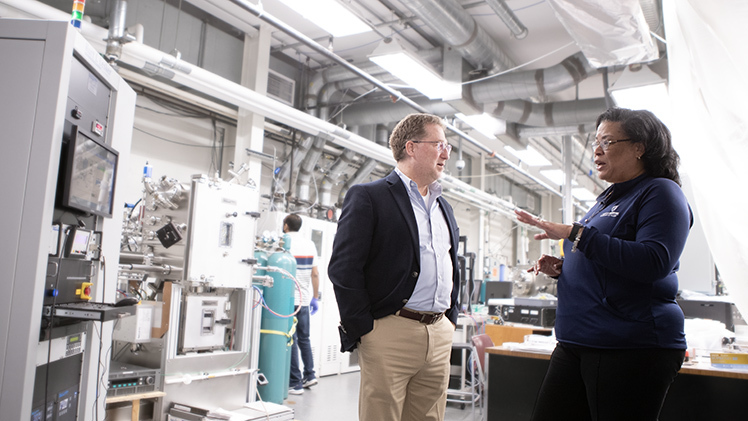The emerging hydrogen economy is projected to trigger new jobs in the United States, ranging from maintenance technicians to highly specialized engineers.
Will the workforce be ready? Yes, with the help of The University of Toledo.

The University of Toledo’s Dr. Mark Mason, Dr. Lesley Berhan and Dr. Sujata Shetty (not pictured) head a collaborative initiative to prepare regional workers for emerging jobs in hydrogen production, distribution, storage and use.
UToledo is the leader of a collaborative initiative aimed at training regional workers for new and existing jobs related to hydrogen production, distribution, storage and use. It’s supported by $3 million in congressionally directed spending through the U.S. Department of Energy.
The cutting-edge initiative reflects the integral role of UToledo, a regional economic force with a $2.8 billion economic impact on northwest Ohio, in strengthening the workforce and the community in and beyond its corner of the state.
“UToledo is committed to preparing students to meet the current and future needs of the workforce,” said Frank Calzonetti, vice president for innovation and economic development at UToledo. “Nearly everything we do is in the service of workforce development from our non-degree certificate programs to our forward-looking academic and professional programs to our grant-supported work to improve workforce training and education and our many research opportunities that provide our graduates skills in the use of cutting-edge technology and research techniques.”
Dean Monske is the president and CEO of the Regional Growth Partnership of Northwest Ohio.
“Talent rising from The University of Toledo helps northwest Ohio remain competitive in the global market,” Monske said. “When it comes to hydrogen energy, this rapidly evolving industrial landscape requires knowledge-based talent with the enhanced skillsets necessary for these growing sectors. In our role of helping companies meet the talent needs of business, we turn to educational institutions like UToledo to ensure success.”
Workforce development activities take numerous shapes at UToledo.
As a leading academic partner in the Northwest Ohio Glass Innovation Hub, a $31.3 million investment announced last year by the Ohio Department of Development, UToledo is co-leading scientific research and preparing highly trained graduates to strengthen the region’s national leadership in glassmaking and solar energy technology.
A major regional undertaking, the innovation hub is expected to create 1,600 new jobs and contribute $284 million to the local economy through 2029.
Other examples range from making sure engineers are trained in latest technologies to supporting great science teachers in all communities.
In the College of Engineering, a recently opened Mechatronics Lab is outfitted with cutting-edge robots, machine vision systems and other equipment funded in part through the Ohio Department of Higher Education’s Regionally Aligned Priorities in Delivering Skills (RAPIDS) and Super RAPIDS programs.
And the Judith Herb College of Education is home to an ongoing initiative to support sixth through 12th grade science teachers in high-need districts in Ohio and Kentucky that’s funded with $2.3 million through the National Science Foundation’s Robert Noyce Scholarship Program.
These initiatives complement standing resources like the UToledo Family Business Center and the UToledo Business Incubator, which recently opened a new APEX Accelerator dedicated to boosting government contract participation in northwest Ohio.
“There are so many opportunities for the University and our expert faculty to partner with industry in ways that benefit students with experiential learning opportunities, advance scientific discoveries and create new jobs in our region,” UToledo Interim President Matt Schroeder said. “As Toledo’s university, we are proud to be the regional force powering opportunities to learn, care, work and play. Supporting workforce development is at the core of that vision.”
The hydrogen workforce initiative entails assessing needs and opportunities for academic degree programs, courses and certifications, with plans to then develop curricula, implement programs and recruit students as early as Fall 2026.
The project will support the use of hydrogen as a clean energy source, an energy carrier and as a precursor to chemical products by training the workforce in the safe use of hydrogen for a number of applications, said UToledo’s Dr. Mark Mason, who draws on his experience as a chemist in his role as principal investigator.
He joins co-principal investigators Dr. Lesley Berhan, a mechanical engineer and associate dean for student success and strategic initiatives in the College of Engineering, and Dr. Sujata Shetty, who brings expertise in urban and regional planning as director of the Jack Ford Urban Affairs Center.
“As an increasingly attractive clean energy source, hydrogen has the potential to transform industries ranging from transportation to energy production,” Mason said. “Our initiative will support the significant investments in this emerging economy by equipping the workforce for new and existing jobs.”
UToledo and its partner institutions are currently completing an intensive information-gathering process, mapping the current hydrogen ecosystem and identifying the skills and trades required in its supporting workforce.
By the spring partners will begin to apply their findings toward curriculum and program development in collaboration with academic partners, including undergraduate courses and academic programs at partner four-year institutions and associate level academic programs, worker training and certification programs at partner community colleges.
“I worked to secure this $3 million award to advance the study of advanced hydrogen technologies at The University of Toledo, Owens Community College, Case Western Reserve University, Cuyahoga Community College, Lorain County Community College and Northwest State Community College in partnership with the Workforce Intelligence Network and the Ohio Aerospace Institute,” said U.S. Rep. Marcy Kaptur, who represents Ohio’s Ninth Congressional District and is the ranking member of the House Appropriations Subcommittee on Energy and Water Development.
“Transitioning to a hydrogen-based economy will require a trained workforce from trade and technical levels through advanced engineering graduates. I am proud to see The University of Toledo leading the way in training the next generation to adapt to cutting-edge innovation and technology. This will help to provide good paying jobs for future generations of workers in northwest Ohio and across our nation.”